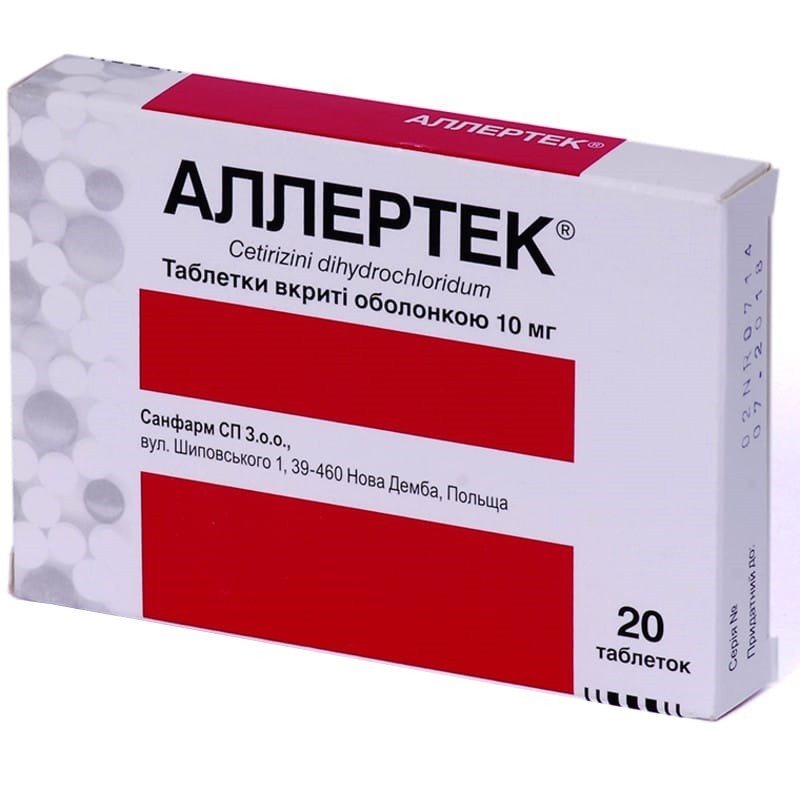



 Secure and encrypted payment processing
Secure and encrypted payment processing We ship to over 40 countries including the USA, UK, Europe, Australia and Japan
We ship to over 40 countries including the USA, UK, Europe, Australia and Japan Guaranteed refund or reship if you haven't received your order
Guaranteed refund or reship if you haven't received your orderCetirizine, a metabolite of hydroxyzine, is a potent selective antagonist of peripheral histamine h1 receptors. in vitro receptor binding studies have not shown significant affinity with receptors other than h1.
In addition to antagonistic effects on H receptors1, cetirizine has an anti-allergic effect: in patients with hypersensitivity (atopy) provoked by an allergen, a dose of 10 mg, which was taken 1 or 2 times a day, inhibits the flow of eosinophils into the skin and conjunctiva.
The placebo-controlled study, in which cetirizine was used in a high daily dose (60 mg) for 7 days, did not show a statistically significant lengthening of the Q – T interval.
The use of cetirizine in usual doses improves the quality of life of patients with chronic and seasonal allergic rhinitis.
Elderly patients. In 16 elderly patients after oral administration of a single dose of 10 mg T½ increased by ≈50%, and clearance decreased by 40% compared with other patients. Perhaps a decrease in the clearance of cetirizine in elderly volunteers is associated with impaired renal function.
Children. Ages 6-12 T½ cetirizine is ≈6 hours, and at the age of 2-6 years - 5 hours. In infants and children aged 6 to 24 months T½ reduced to 3.1 hours
Patients with impaired renal function
The pharmacokinetics of the drug for mild renal impairment (creatinine clearance 40 ml / min) was similar to that in healthy volunteers. In patients with moderate impaired renal function T½ was 3 times greater, and clearance was 70% lower than that of healthy volunteers.
In patients on hemodialysis (creatinine clearance 7 ml / min), with the use of cetirizine in a single dose of 10 mg T½ was 3 times greater, and clearance was 70% lower than that of healthy volunteers. During hemodialysis, cetirizine is removed from the blood plasma in an insignificant amount. Patients with moderate or severe renal impairment require dose adjustment.
Patients with impaired liver function. In people with chronic liver diseases (biliary cirrhosis, liver disease associated with cholestasis) who used 10 or 20 mg of cetirizine in a single dose, T½ increased by 50%, and clearance decreased by 40% compared with healthy volunteers. Dose adjustment is necessary only in cases of combined impaired liver function and kidney function.
Symptomatic therapy:
- chronic allergic rhinitis;
- seasonal allergic rhinitis (hay rhinitis);
- allergic conjunctivitis;
- chronic idiopathic urticaria.
Apply orally, washing the tablet with a glass of water. swallow tablets without chewing.
Children aged 4 to 6 years: 5 mg (½ tablet) once.
Children aged 6 to 12 years: 5 mg (½ tablets) 2 times a day.
Adults and children over the age of 12 years: 10 mg (1 tablet) once a day.
Elderly patients. There are no data indicating the need to reduce the dose for the elderly, if kidney function is not impaired.
Patients with moderate or severe renal impairment
There is no evidence of an efficacy / safety ratio for patients with impaired renal function. But since cetirizine is secreted mainly by the kidneys, if alternative treatment is not possible, the intervals between doses should be determined individually, depending on the function of the kidneys.
The dosage should be modified as indicated in the table below.
To use the table, you must find the creatinine clearance (Clkr) ml / min. Clkr (ml / min) can be calculated based on the concentration of creatinine in plasma (mg / dl) according to the formula:
Clkr = ([140 - age (years)] x body weight (kg) / 72 x plasma creatinine concentration (mg / dl)) x (x 0.85 for women)
Dose adjustment for adult patients with impaired renal function
| Kidney function status | Creatinine clearance (ml / min) | Dose and frequency of administration |
| Normal kidney function | ≥80 | 10 mg once a day |
| Minor renal impairment | 50–79 | 10 mg once a day |
| Moderate renal impairment | 30–49 | 5 mg once a day |
| Severe renal impairment | 30 | 5 mg every other day |
| Dialysis patients | 10 | Contraindicated |
For children with impaired renal function, the dose should be prescribed individually, taking into account creatinine clearance, age and weight